How To Clean And Make Your Computer Run Faster
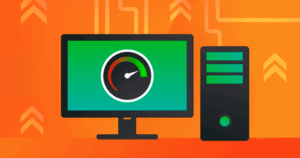
Short on time? Here's the fastest, quickest, and easiest way to speed up (and clean) your computer:
- Download TotalAV — this program has one of the best Windows performance and system optimizers on the market. Simply install the program and the Automatic Optimizer will increase CPU speed, reduce startup times, reduce lag, clean out system junk, remove duplicate and cache files, and do a lot more.
If your computer is running slow, don't panic.
Slower PC performance over time is completely normal, especially after years of constant use. It can be caused by a lot of things, from a too-full disk drive to a complete hardware failure.
Usually, you can restore your machine back to its optimal performance with some simple fixes that most non-technical users can do at home.
Here are 20 simple solutions for speeding up and cleaning a computer. These fixes will help you significantly speed up your device, extend your PC's lifespan, and save you time and money.
Why Do Computers Slow Down Over Time?
Computer slowdown can be caused by many different factors, including:
- Old and outdated hardware.
- Software issues.
- Viruses or system malware.
After years of constant use, computer components can wear down, resulting in slower performance. This is totally normal, though it can be a bit annoying. While you may be tempted to upgrade to a new device, there are a few things you can do to help speed up old systems.
Also, the more software you install, the more files you store, and the more you use your computer's processors, the harder your machine has to work. Some software may be unnecessarily slowing your system by running in the background and therefore slowly draining you processing power and battery life.
Computer slowdowns can also be a result of viruses and malware. PC viruses and malware such as ransomware, spyware, and keyloggers can get onto computers pretty easily if you don't have proper internet security protections in place. Once malware is on a user's system, it's sometimes hard to know it's there, and getting rid of it can be a nightmare if you don't have a reliable antivirus installed.
So let's go through 20 quick and easy ways to speed up and clean your computer.
1. Restart Your Computer
Restarting your computer is probably the easiest fix for almost any PC problem, including general system slowdowns. When you restart your computer, you stop all running software, tasks, processes, and open pieces of data that are draining your computer's processing power.
When you boot back up, your computer will have a lot more free memory to operate, which is why it will likely perform a lot faster.
Because restarting your machine is almost effortless (and pretty quick), you should always use this method first before trying anything else.
2. Stop Heavy-Duty Tasks & Programs
A computer's slowdown is often related to programs that require a lot of RAM, CPU power, or hard drive space to run properly.
You can manually close the apps and programs you're not using, or you can open the Windows Task Manager that shows what programs and background processes are using most of your RAM, CPU, and memory.
To do this, open up Task Manager (right-click the "Windows Start" icon in the lower-left corner, select "Task Manager"), find the program you want to close under the "Processes" tab, select the particular program or process that you want to stop, and click "End Task" at the bottom right-hand corner of the window. You can also do this by right-clicking on the program you wish to close and clicking "End Task".
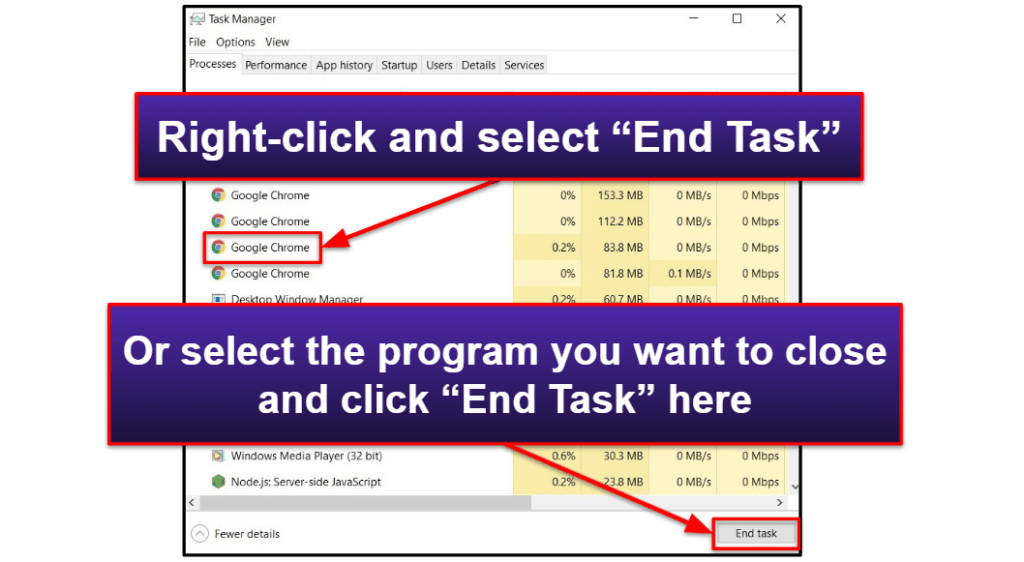
Doing this will drastically reduce the drain on your CPU and likely speed up computer performance, and it will also extend your computer battery's lifespan (if you have a laptop).
3. Download a Device Optimization Program
Device optimization programs — like the ones included with antiviruses like Norton and TotalAV — make cleaning and speeding up your PC extremely easy.
For example, TotalAV's System Tune Up feature manages your device's memory usage by identifying apps that consume too much of your device's memory and resources and giving you a list of suggested apps to close.
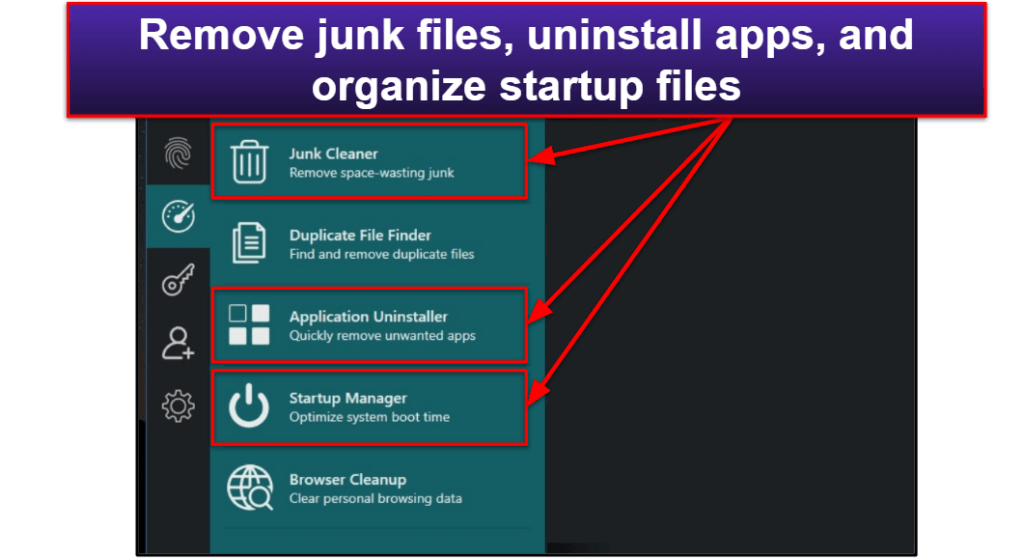
Most top antivirus brands offering optimization features are subscription-based. Fortunately, they are all pretty affordable. And antiviruses like TotalAV offer a 30-day money-back guarantee, which means you can optimize and clean up your PC and get a full refund if you don't want to keep the program — making this fix totally free.
4. Remove Unused Apps, Software & Bloatware
If you have too many pieces of software installed and/or running, your computer is not going to be as quick and optimized as it should be.
While many programs are important, you should delete anything you no longer use. You'll also want to remove the "bloatware" that comes pre-installed on most computers these days — sponsored apps and utilities that you have no real use for.
To remove unused programs and bloatware, right-click on the "Windows Start" button on your lower-left corner and choose "Apps and Features" to see a list of all of your computer's installed software. From there, it's easy to uninstall programs and stop them from using your PC's resources.
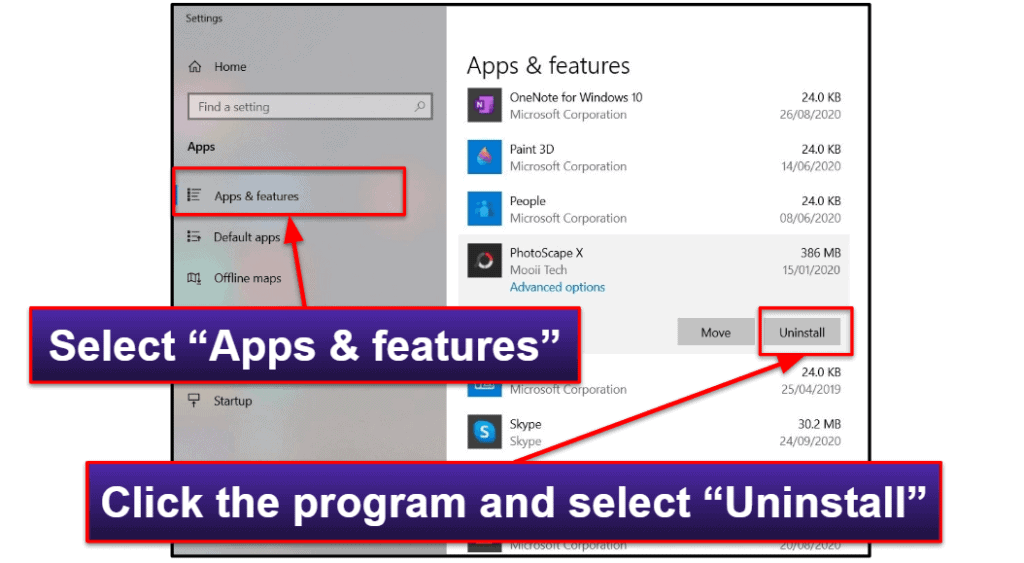
Alternatively, you can use antivirus software that comes with device optimization features (#3) to find unnecessary programs, duplicate files, caches and cookies, and speed up your computer.
5. Delete Large Files (Manually and with Disk Cleanup)
After years of use, a lot of your computer's storage may include data like:
- Leftover files from program installs.
- Offline web pages.
- Temporary files.
- Setup log files.
- File compression.
- And more…
Eventually, these files will build up into "monster files" that make your computer work harder.
Removing these files can take anywhere from a few minutes to an hour (or even longer), depending on their size. To avoid the long wait, try cleaning unnecessary files after completing every task.
To do this, right-click the "Windows Start" button and open the File Explorer. Then select "This PC".
Using the search box on the top right-hand corner, type "size:empty". This will return results for files that are 0 bytes. You can then click on the "Search" tab and choose a size from "Empty to Gigantic". From there, delete any of the "Large", "Huge", or "Gigantic" files that are unimportant.
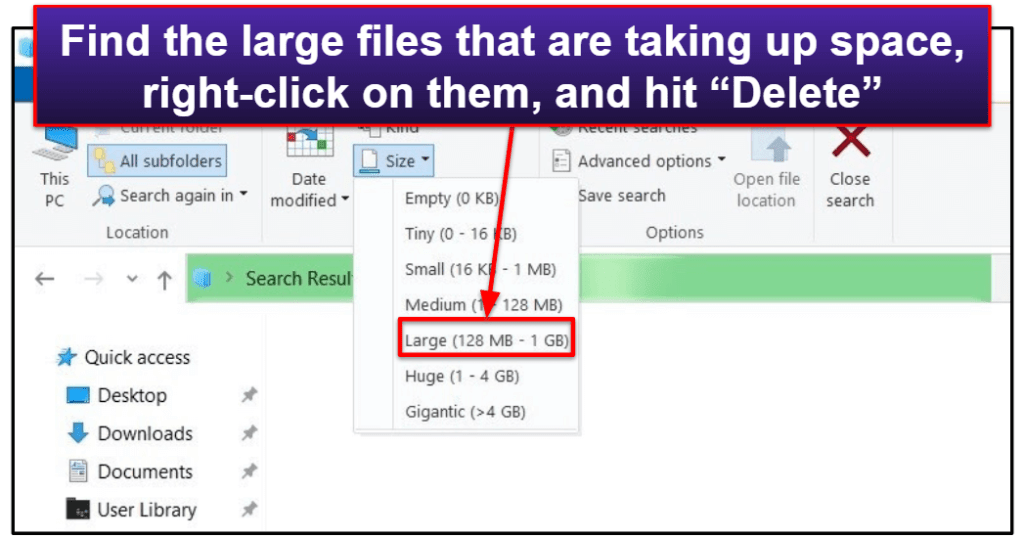
Type "Disk Cleanup" in the search box next to the Windows icon and click on the app. Then, select the drive you want to access.
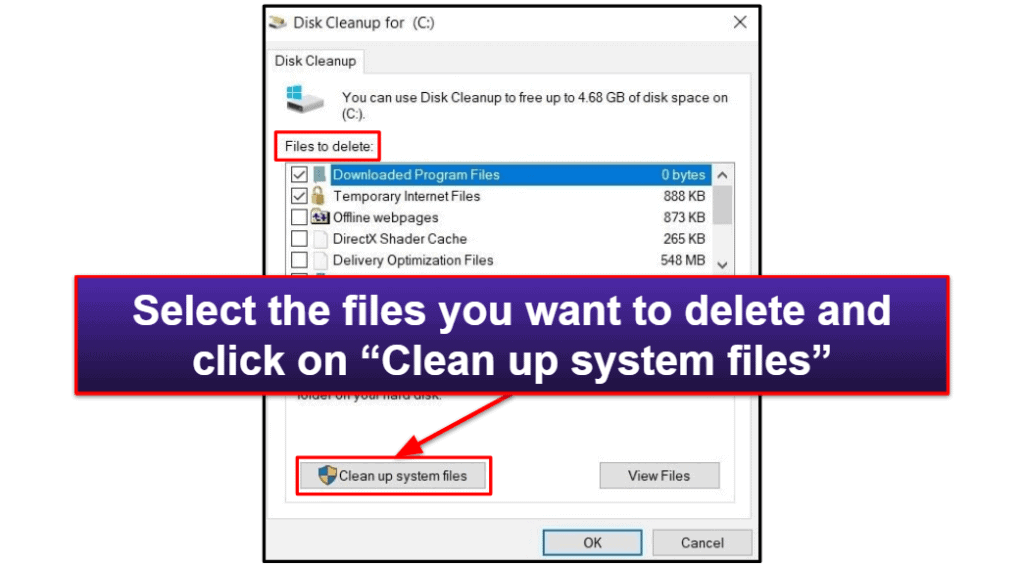
Keep in mind that these kinds of files accumulate real fast, so it's important to regularly delete them from your hard drive.
6. Delete Old Files & Downloads
The Disk Cleanup utility is perfect for deleting files you never even knew were taking up space, but chances are you have even more old files that can be deleted in order to free up room.
The biggest culprits to look at are photos, videos, and files in your Downloads folder. Over the course of several years, your Downloads folder accumulates photos, documents, and email attachments that you might no longer need — and they take up a ton of room on your computer's hard drive.
Consider moving some files to a cloud storage platform, like OneDrive, or backing up files onto a separate drive to free up space on your main computer's storage. This can significantly improve your computer speed.
Backing up files also protects you in case your hard drive fails, you lose your computer, or if other damages occur.
You can use OneDrive to keep anything you don't need to access often. It's already built into the Windows operating system, it's easy to use, and it's free.
To manage your OneDrive, open the File Explorer, right-click "OneDrive", and click on "Settings".
You can manage all the settings there, including when and where to backup old and unused files. If you want to delete something off of your computer but save it to OneDrive, make sure it's synced to the OneDrive cloud before you delete it off of your computer.
7. Empty Your Recycle Bin
Most people delete files, but these files get moved to the Recycle Bin and are then forgotten about. It's important to regularly empty the Recycle Bin to fully remove deleted files from your system.

When you permanently remove your files from your PC, they're gone forever — unless you've backed them up onto your external hard drive or to a cloud storage platform.
8. Remove Unused Browser Extensions
If your internet browser is running slow, that might be because you have too many extensions running at the same time.
Removing extensions that you don't need saves computer memory, thereby speeding up its overall performance.
If you're using Google Chrome, simply right-click on the extension icon you want to remove and choose "Remove from Chrome".
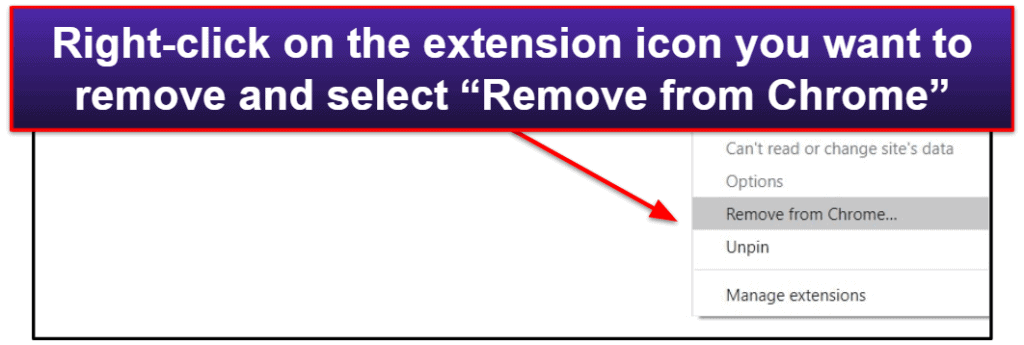
The process is the same for Microsoft Edge.
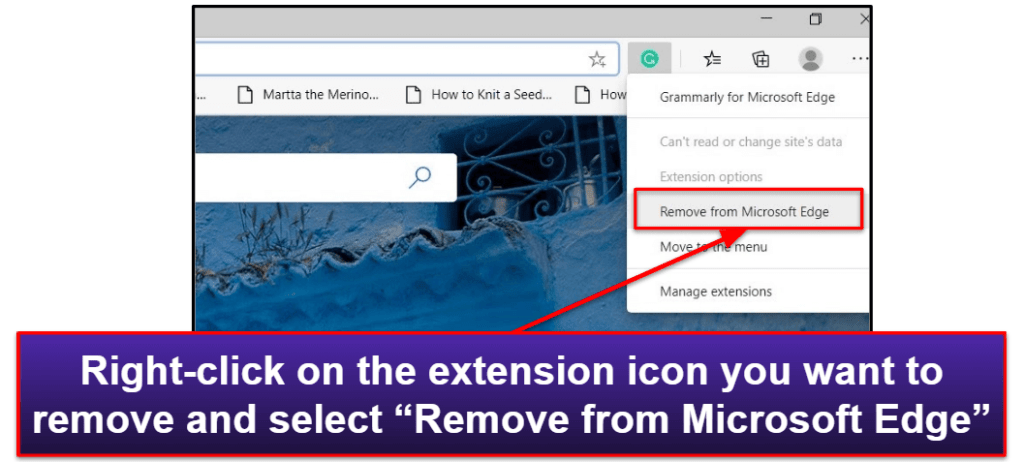
If you see any extension you don't recognize or don't use, you should immediately uninstall it.
This method applies even to tiny browser extensions that may look harmless at first but can significantly eat up your computer's memory.
In general, anything that doesn't need to be on your computer should be removed, and that includes browser extensions.
9. Clear Browser Cache, History & Temporary Internet Files
Unless you have a specific need to keep track of your browser history, you should regularly clear it out. This will prevent your computer and web browser from lagging. When clearing your browsing data, you should also clear cookies, cached images, and other temporary files.
In Chrome, go to the main Chrome menu (3 vertical dots) on the upper right-hand corner of your browser and click on "History". Select "Clear browsing data" to see all of your options.
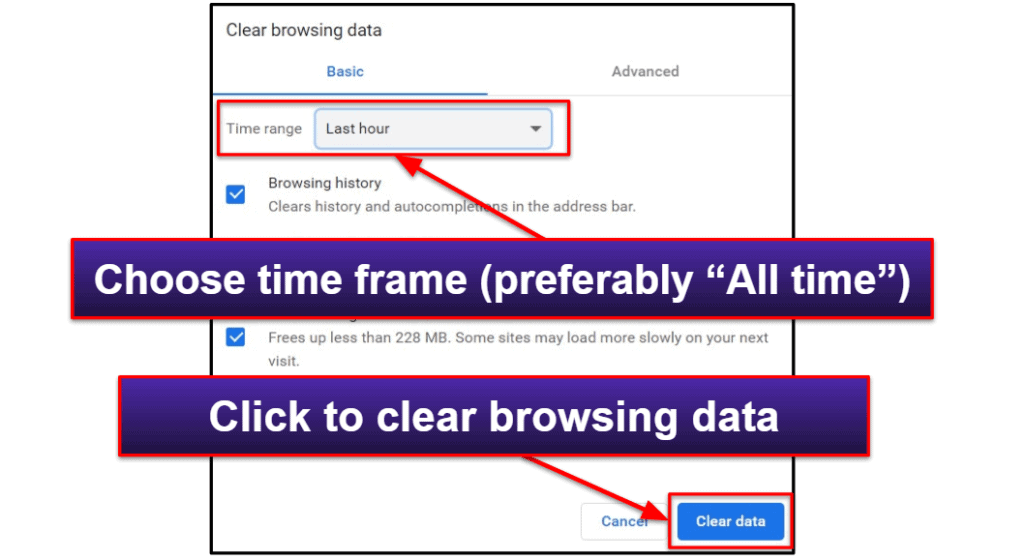
The process is pretty much the same for most browsers — just go into your browser settings and clear the history.
Alternatively, you can use third-party tools like TotalAV, which doesn't only offer safe browsing with antivirus protection but also cleans cookies and browsing history with a couple of clicks.
To maintain stable computer speed, make a habit of regularly clearing browser cache, history, and temporary internet files.
10. Optimize Startup Applications with the Task Manager
Your computer usually launches all kinds of different processes, tasks, and programs upon booting up. Some programs are necessary and helpful, but others can unnecessarily slow down startup times.
You can manage what startup programs you want to be running in the background using the Task Manager.
Open the Task Manager and choose the "Startup" tab. You'll see a list of all of the programs that launch every time your computer turns on (along with each program's impact on startup speed).
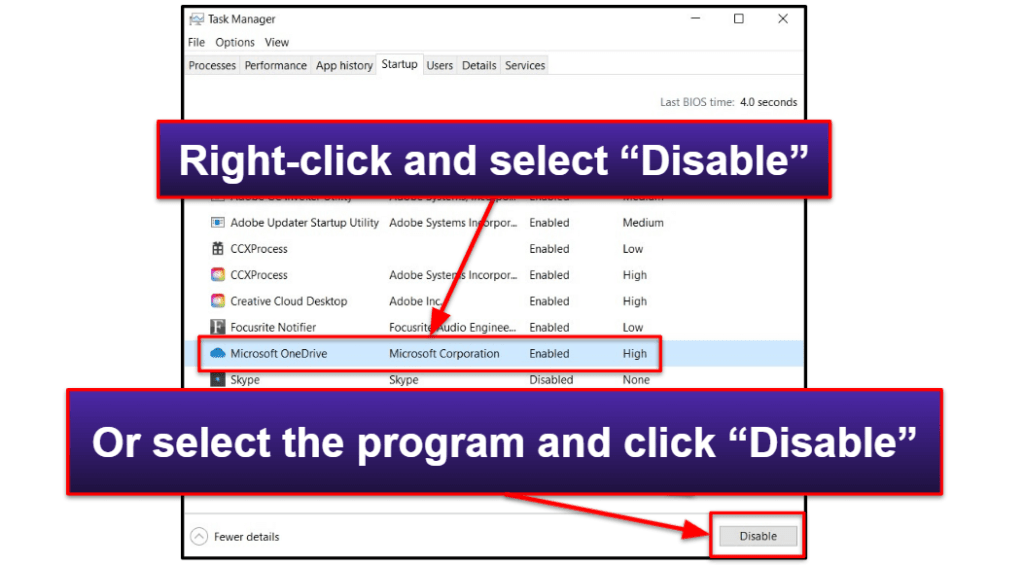
Again, antiviruses like TotalAV make this process easy by letting you easily enable and disable startup programs.
11. Check for Malware, Adware & Spyware
Malware and viruses can infect your computer and impact performance by taking over computer resources in the background.
Reputable antivirus software can help protect your PC by scanning for and removing threats. The best antiviruses include real-time protection to block malware from entering your system in the first place.
There are many free antiviruses available, but most of them lack comprehensive malware and internet security protections. But many top antiviruses come at affordable prices, and they all come with money-back guarantees, so you can purchase the product, check/clean your device, and then return the product before the money-back guarantee is over.
My favorite antivirus is Norton 360 — it's got 100% malware detection/removal rates along with one of the best device optimizers on the market. TotalAV is also a really good option as it comes with additional features, including device optimization tools that are easy to use for non-technical users.
12. Turn Off Search Indexing
To help you find the files and programs you need as fast as possible, Windows PCs keep an up-to-date index of all of your drives.
Ironically, building this index takes up system resources (especially for low-powered PCs) and can slow down your computer's performance. But you can always turn off or tweak search indexing.
To turn off search indexing, go to the "Indexing Options Control Panel" (type "index" in the Start button search box) and click on "Modify". Deselect all of your computer's drives if you don't want them to be indexed.
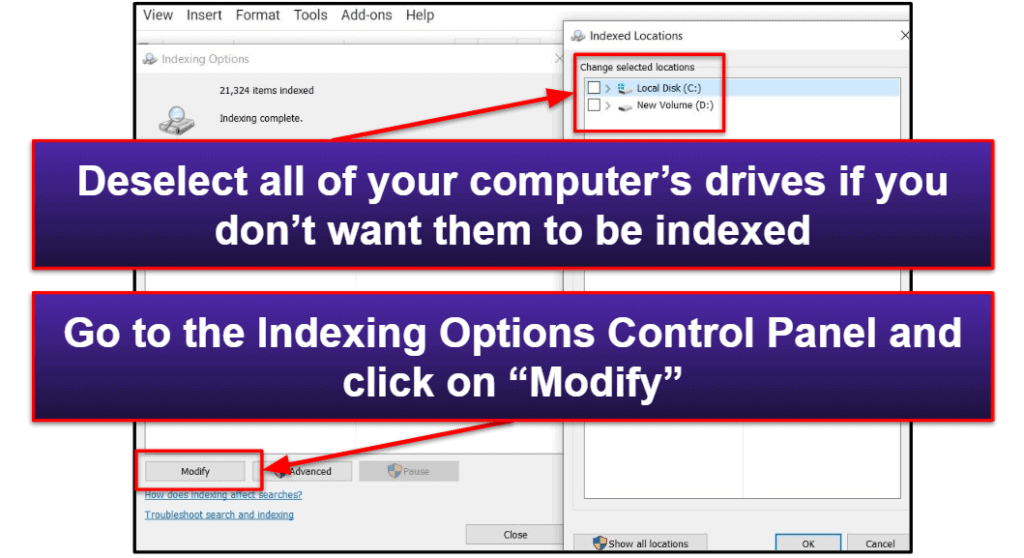
13. Run the Troubleshooter
Sometimes there are hidden settings that are impacting performance, and you can find and fix problems with some general troubleshooting.
Search for "Troubleshoot settings" in the search bar. Then, click on each one of the areas in the troubleshoot list and click "Run the troubleshooter" to analyze your system for issues.
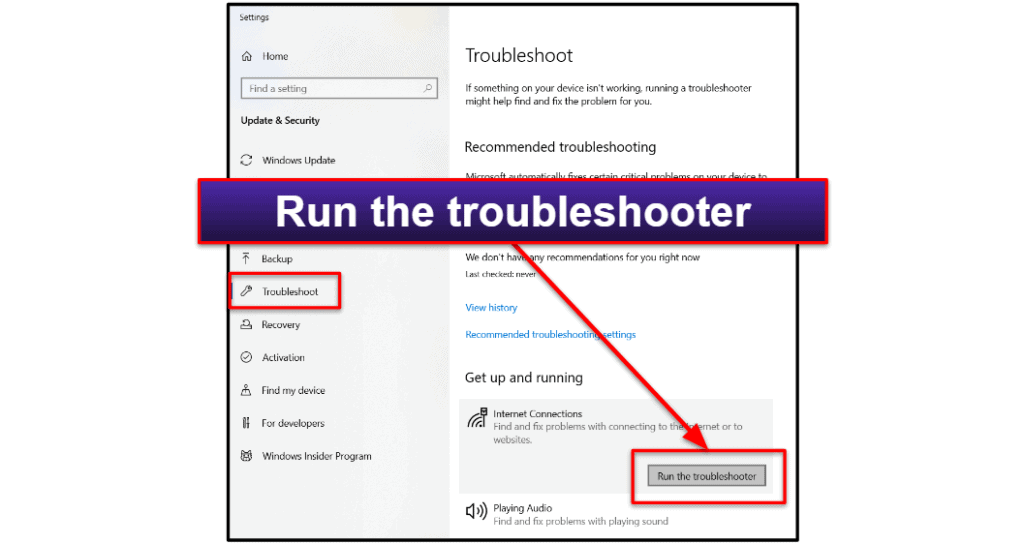
14. Adjust Appearance & Visual Settings
Adjusting your computer's visualizations likely won't dramatically improve performance, but it could help in some cases.
All you have to do is type "adjust the appearance and performance of Windows" in the search box and click on the setting that appears — this will open the "Performance Options" dialog box.
You can either uncheck specific appearance settings or just choose the setting "Adjust for best performance". This causes you to lose all of your system's visual effects (like fades and animations) which may help with speed a little bit.
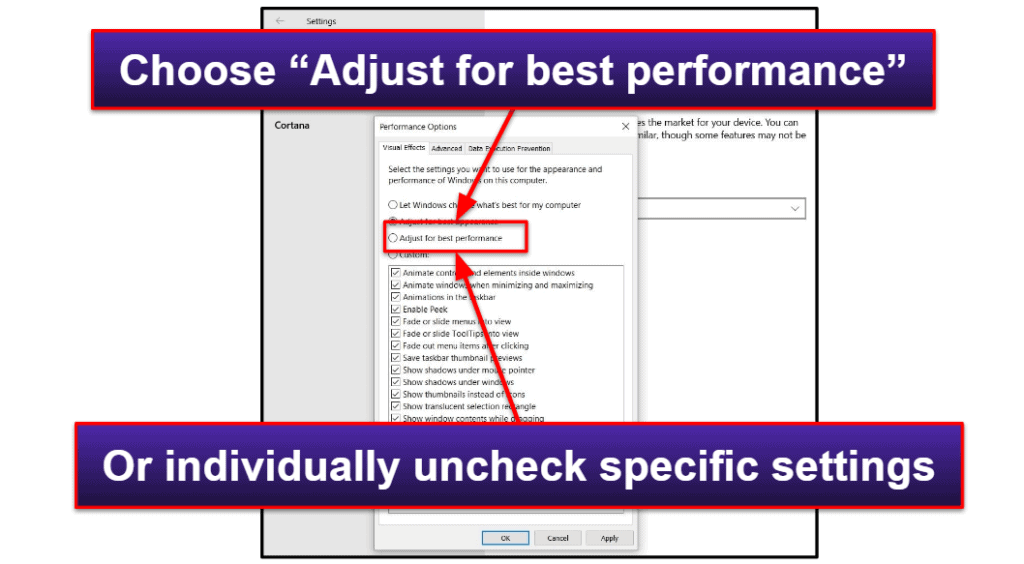
15. Change Your PC's Power Settings
Your computer sometimes reserves a little bit of performance in order to save energy, especially in the case of laptops that aren't connected to a power outlet.
Changing your PC's power settings is easy. Simply click on the battery icon in your Windows tray and slide the slider to "Best Performance".

16. Scan Your Hard Drive for Errors
One possible cause of a PC slowdown is an error in the way your hard drive stores and accesses data.
Luckily, Windows has a built-in utility that helps scan and fix hard drive problems like bad sectors, lost clusters, or directory errors. To check for hard drive errors, right-click on your local disk (usually the C: drive) in the File Explorer, choose "Properties", go into the "Tools" tab, and click "Check".

Some computers will start the scan automatically, but your computer may have two options — "Scan for and attempt recovery of bad sectors", which is on by default, and "Automatically fix file system errors", which is unchecked by default. Tick "Automatically fix file system errors".
The scan may take a couple of minutes to complete.
Your PC will inform you whether everything is okay or if there are errors to fix.
Alternatively, you can also run CHKDSK via the command prompt window. Right-click the "Windows Start" icon in the lower-left corner, then select "Windows PowerShell (Admin)". In the command prompt window, type in "CHKDSK", then a space, followed by the disk you want to check. So to check the C drive, type "CHKDSK C:" and then press enter.
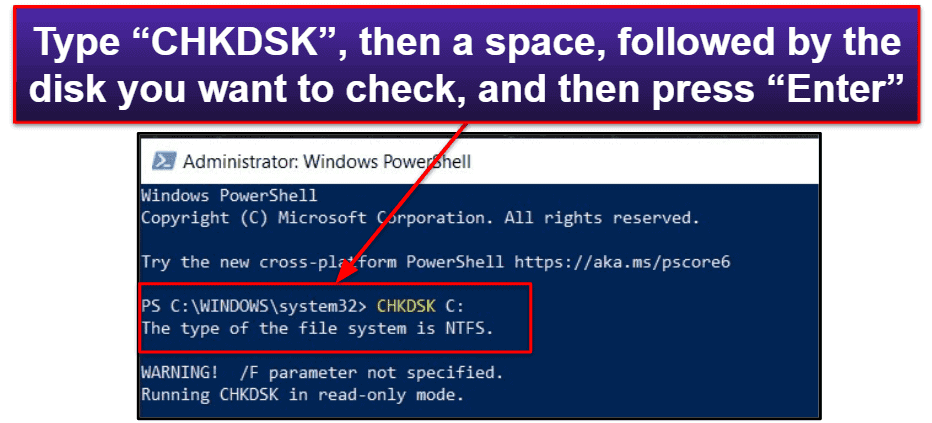
Whichever one you prefer, both methods will help you scan your hard drive for errors.
17. Defragment Your Hard Drive (HDD only)
Defragmenting your hard drive basically means better organizing the data it stores.
Older-style HDDs (hard disk drives) get a little messy and chaotic over time as they move bits of data around. Defragmenting helps sort the data and puts it where it should be, making it easier and faster to access.
Try this method if all of the earlier solutions aren't effective enough in speeding up your computer.
This process may take several hours to complete, depending on the size of the file storage.
All you have to do to defrag your HDD is search in the Windows search box for "defrag" and open the "Defragment and Optimize Drives" app. When you open the app, choose the drive you want to clean up and hit "Optimize".
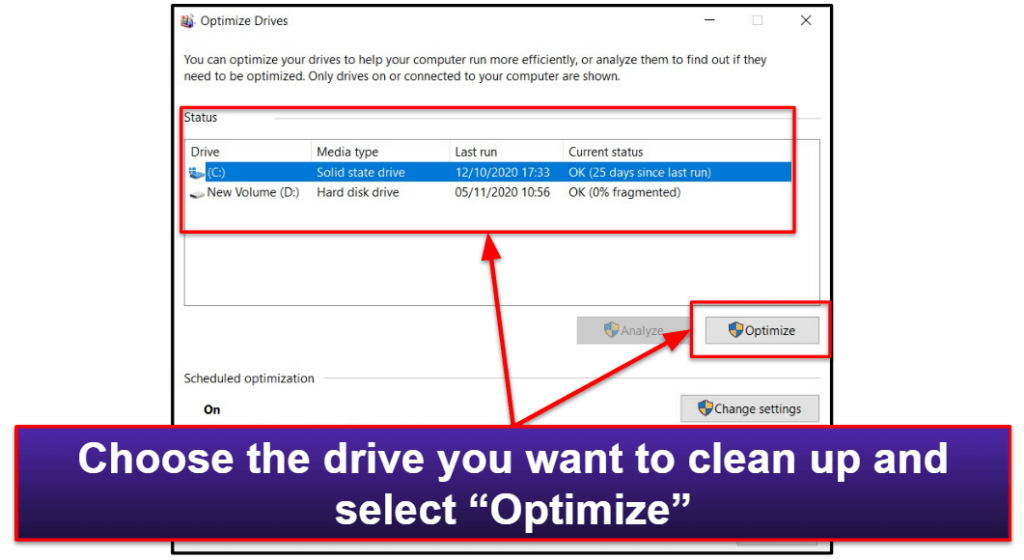
Important: Y ou shouldn't perform this method on Solid State Drives (SSDs). That's because defragmentation can cause unnecessary wear and tear to an SSD. This can lower the lifespan of the SSD.
18. Reinstall Windows
If your computer is severely slowed down, consider starting again with a fresh version of Windows.
You can do this from home and you won't need to pay for a new version of Windows if you already have Windows installed and activated. But installation can take up to a few hours, and you will need to reinstall all of your apps and settings (and maybe even your files).
To do this, first, back up all of your files, and make absolutely sure that your files are backed up.
Then, go into your computer's "Settings" panel and click on "Update & Security". Then click on "Recovery" and then "Get started".
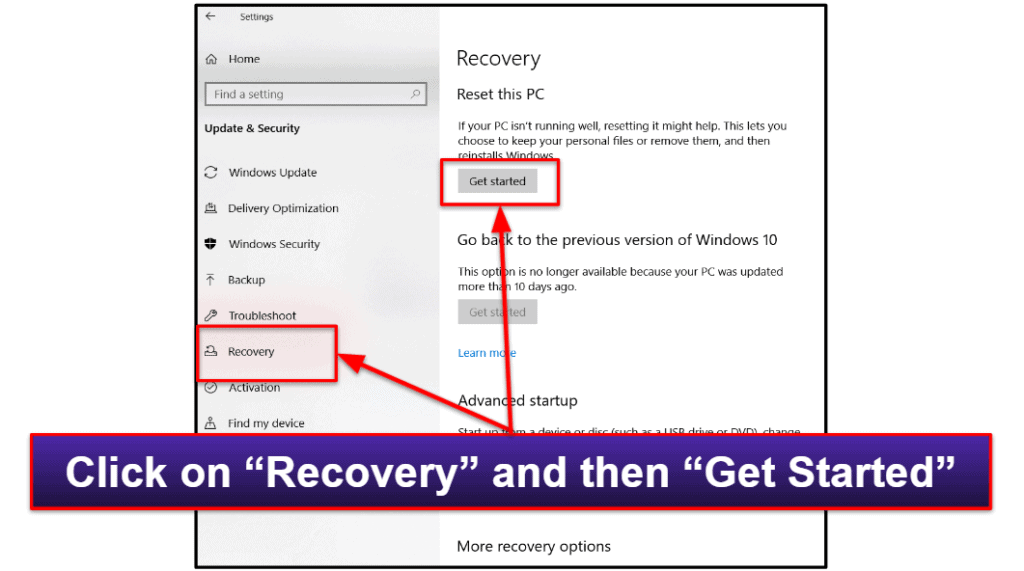
You'll have the option to "Keep my files" which will only remove apps and settings or "Remove everything" which will completely remove all files, apps, and settings.
Regardless of which one you choose, make sure that your files are backed up.
19. Overclock Your CPU
Overclocking essentially means forcing your CPU components to run faster than they were designed to.
This method can be a bit dangerous, as overclocking can cause processors to overheat and become damaged. It may not even be possible to overclock your CPU if the motherboard is locked.
Overclocking can also be very time-consuming and expensive if you mess up the CPU in the process.
I wouldn't recommend this option for most users. But for advanced, technically-minded users who are experienced in upgrading their PC, this might be something worth trying.
Before overclocking your CPU, you'll need to upgrade your computer's cooling system (with a higher-powered fan) and update the clock rate via the BIOS.
If you have the experience and know-how, this is a clever, backdoor way to speed up a computer.
20. Upgrade Your Computer's Hardware
If all else fails, there could be mechanical problems that are limiting your computer's performance. Maybe your computer components are just so out of date that they can't keep up with modern demands.
Therefore, consider upgrading some of your computer's components to speed up your system. Desktop PCs will usually be easier to upgrade than laptops, but always check with your manufacturer first.
You have a few options here, depending on what's causing your computer's slowdown:
- Upgrade your computer's RAM to handle more tasks at the same time.
- Switch your HDD for an SSD for faster and easier access to files and shorter load times.
- Upgrade your GPU (graphics processor) for a better experience with gaming and high-definition video.
It's always best to seek professional advice and assistance when upgrading your computer's RAM, hard drive, GPU, or any other components.
Maintaining Good PC Performance
Regardless of what's causing your PC to slow down over time, there are a few best practices to keep in mind for better day-to-day performance such as:
- Always close apps and software you're not using.
- Move large files to an external storage drive and/or to a cloud storage platform.
- Regularly empty your Recycle Bin and delete software caches and unnecessary downloads.
- Restart your computer regularly.
- Do occasional defrags (if you have an HDD) and chkdsk scans for errors.
- Protect your device with a reliable antivirus program.
In most cases, these simple fixes should improve your computer's speed. Antivirus software like Norton 360 and TotalAVare well known for enhancing computer performance in addition to providing protections against cyber threats.
However, all computers and their components degrade and have to be replaced or upgraded over time. But with proper care, you can delay that and give your computer a long, happy life.
The Top Antiviruses (with Excellent Device Optimizers) in 2021:

/ year

/ year

/ year

/ year

/ year
About the Author

About the Author
Alex Kassian is a software and tech developer who regularly travels around the globe for both work and pleasure. He's incredibly passionate about cybersecurity, after having to rescue his girlfriend and family members from multiple cyber attacks over the years. He loves testing different antivirus programs and other cybersecurity products to find out which ones offer the best protection.
How To Clean And Make Your Computer Run Faster
Source: https://www.safetydetectives.com/blog/speeding-up-your-pc/
Posted by: jeffersonwhout1979.blogspot.com

0 Response to "How To Clean And Make Your Computer Run Faster"
Post a Comment